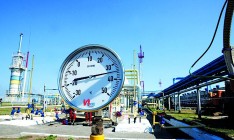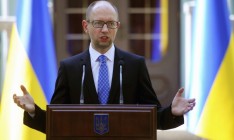Business
offerUkraine has offered its GTS to Norway. The risks of such a deal are very high

The Ukrainian government is actively promoting the idea of selling the Ukrainian gas transport system (GTS). At yesterday’s Norwegian-Ukrainian business forum Premier Arseniy Yatsenyuk proposed Scandinavian companies to participate in its acquisition and further exploitation. Every year, the share of the sale of Russian gas in Europe is declining, which means that the Ukrainian GTS is becoming less attractive for the investors.
Norsemen to visit us
Yatsenyuk yesterday stated that Ukraine is interested in participation of companies from Norway in consortiums for the management of the GTS and underground gas storage facilities (UGSF). In order to attract Norwegian partners the Ukrainian authorities are ready to introduce amendments to the law on reforming the Ukrainian GTS adopted and signed by the president in early September.
Under this law, the GTS and UGSF remain under state ownership, but they can be transferred to the management by specially formed companies. In these companies the government will hold the controlling stake, while the remaining shares can be acquired by legal entities controlled by the states of the European Union, the U.S. or the Energy Community. Norway is not a member of the European Union, though it does have the status of an observer in the Energy Community. “If Norwegian companies representing the energy sector are ready to invest in the GTS of Ukraine, our parliament is ready to adopt the law that will allow not only European, but also Norwegian companies to directly invest in the GTS and UGSF,” promised the premier.
Norway has not yet sent out a clear signal about its interest in this project. Norwegian Minister of the EEA and EU Affairs Vidar Helgesen only confirmed that at the talks with Yatsenyuk they discussed energy cooperation of Ukraine and Norway. He said Norway is ready to increase financial support for the Ukrainian projects on energy efficiency, which will be implemented with assistance of the EBRD. “We will share the experience of development of gas and electricity markets so that Ukraine can more successfully integrate into the EU and help Ukraine in reforms in its energy sector,” he said.
Time is playing against us
The government is trying to accelerate attraction of partners in the Ukrainian GTS and UGSF. For instance, back on October 31, Yatsenyuk gave an instruction to the Ministry of Energy and Coal Industry and Naftogaz of Ukraine to prepare conditions of a public tender for attracting investors. Moreover, the premier set a short term of one week for this.
Up until now, there is no information that these conditions have been drafted. However, Business Development Director of Naftogaz of Ukraine Yuriy Vitrenko yesterday stated that the Ukrainian authorities will be able to implement their plans no earlier than in two years. He explained that the privatization of even comparatively small companies in Ukraine takes 12-18 months, which is why in the case of the GTS the period will not any shorter: a year for preparations and 12-18 months for its sale. In addition to that, Vitrenko noted that there are already companies interested in investing in the Ukrainian GTS, though he refused to name them.
Time, in this case, is not on the side of the government. The EU, scared by the policy of blackmailing by Russia’s Gazprom, will try to reduce its dependence on the Russian company: its share on the European market will be declining and therefore the role of Ukraine’s GTS in the transit of this gas will also decrease. At that, the trade of Russian gas has been closely tied to the policies of the Russian authorities in recent years.
Partner at the RusEnergy consulting agency Mykhailo Krutykhin believes potential investors in the Ukrainian GTS are driven away by political risks and comparatively low profits from the transit of Russian gas, which could be suspended altogether. Krutykhin reminded that Europe is preparing for the disruptions of Russian gas supplies and is conducting stress tests of its gas transport systems. “That is why it is very difficult to imagine a real commercial company, which, caring about the interests of its shareholders and maximization of their profits, would agree to be a share operator of the Ukrainian GTS. From a commercial standpoint, this would not be the safest investment of capital,” he said.
At the same time, Krutykhin noted that the Ukrainian UGSF still has bright prospects. European gas traders and not only those from countries neighboring with Ukraine, but also from Norway, may be interested in renting them.






 of the agreement of syndication with Financial Times Limited are strictly prohibited. Use of materials which refers to France-Presse, Reuters, Interfax-Ukraine, Ukrainian News, UNIAN agencies is strictly prohibited. Materials marked
of the agreement of syndication with Financial Times Limited are strictly prohibited. Use of materials which refers to France-Presse, Reuters, Interfax-Ukraine, Ukrainian News, UNIAN agencies is strictly prohibited. Materials marked  are published as advertisements.
are published as advertisements.